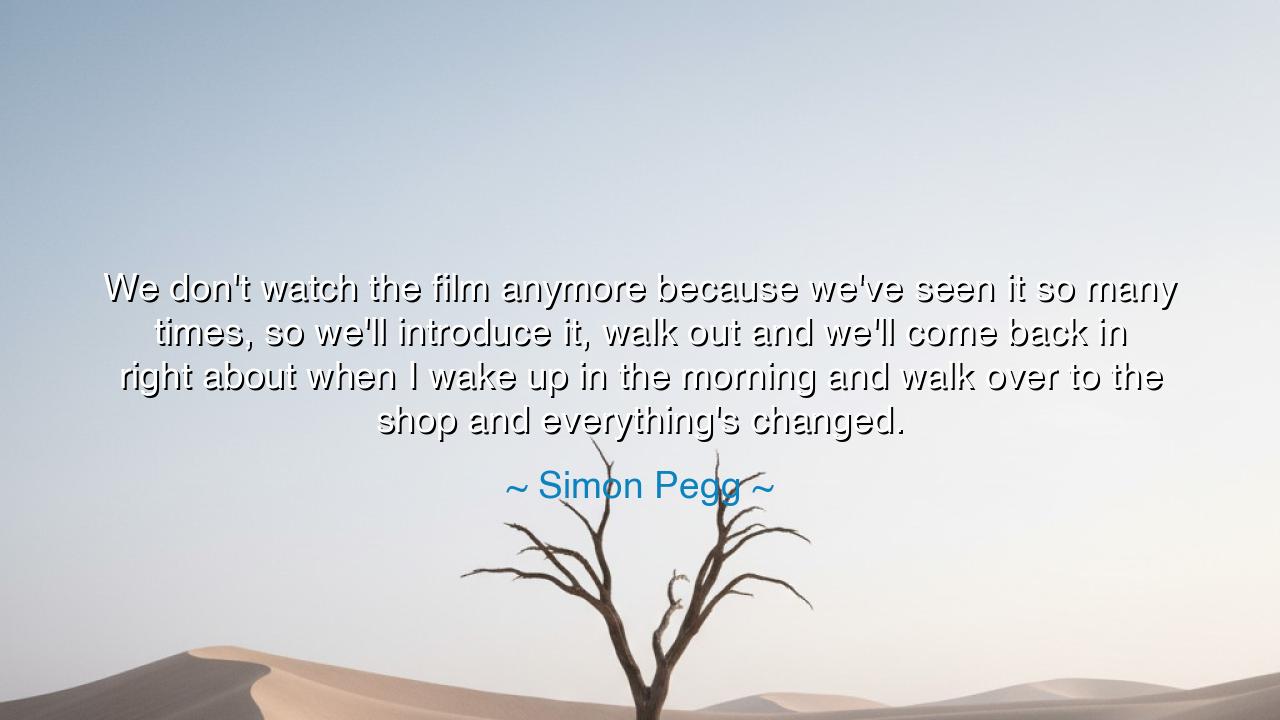
We don't watch the film anymore because we've seen it so many
We don't watch the film anymore because we've seen it so many times, so we'll introduce it, walk out and we'll come back in right about when I wake up in the morning and walk over to the shop and everything's changed.






"We don't watch the film anymore because we've seen it so many times, so we'll introduce it, walk out and we'll come back in right about when I wake up in the morning and walk over to the shop and everything's changed." — Simon Pegg. In these words, Simon Pegg reflects on a truth that is as old as human nature itself: the longing for novelty and the way in which time changes our perception of the world. A film, once fresh and exciting, can become something we only revisit for the comfort of familiarity, for the pleasure of a story we know by heart. And yet, despite the repetition, each viewing holds something new, something unexpected—just as the mundane, everyday moments of life can surprise us when we return to them with fresh eyes.
In the ancient world, the concept of time and repetition was deeply explored. Heraclitus, the philosopher of flux, famously declared, "You cannot step into the same river twice." Though the river may appear the same, it is ever-changing, as are the waters and the observer. In Pegg’s words, we see this same paradox—though we may revisit a film, or a moment in time, it is never truly the same. We, too, have changed, and in doing so, we bring a new understanding to the familiar. Heraclitus understood that everything is in a constant state of becoming, and what Pegg describes—revisiting something old with a new perspective—echoes this eternal truth. The film is the same, yet we are not.
Consider the myth of Odysseus, who, after many years of wandering, returns home to Ithaca. The homecoming he so desperately seeks is fraught with change—not just in the external world but within himself. When Odysseus steps ashore, his kingdom is in turmoil, and he is a stranger in his own land. The journey has transformed him, as it transforms us all. He finds that, though the landscape and the people remain, everything has changed. The same story, the same longing, is now viewed through the lens of wisdom and experience, and thus even the most familiar places and people take on new meaning. Pegg’s idea is akin to Odysseus’ return: although the film remains, it is never truly the same because we—the audience, the observer—have changed.
This theme of change and transformation is also reflected in the life of Socrates, who spent his days asking the people of Athens to question their assumptions and beliefs. His conversations were never meant to find simple, static answers, but to guide his disciples toward a deeper understanding of themselves and the world around them. Much like Pegg’s reflection on the repetitive viewing of a film, Socrates taught that the process of questioning and reflecting on what we already know is how we come to see the world anew. The act of returning to a familiar thought or idea, of revisiting something we think we understand, can reveal new truths, just as Socrates demonstrated through his relentless pursuit of wisdom.
In Pegg’s words, we also hear a reflection on the human need for comfort amid change. The ritual of revisiting a film, or a place, or an experience is often a way to ground ourselves in a world that feels constantly in flux. Films, like familiar rituals, offer a sense of stability, a reassurance that we are anchored in something we know, something that will not betray us. But as Pegg suggests, we cannot stay within this comfort forever. Even in the most familiar places, when we return, we will find that everything has changed. We, too, are constantly evolving. Change is not something to fear, but something to embrace, for it is through change that we learn and grow.
The lesson here, dear listener, is that the world is never truly static. What may seem familiar to us—the places we know, the films we watch, the conversations we have—are always subject to transformation. And while we may return to them, we must recognize that we have changed, and thus, our perception of these things has shifted. This is not something to resist but to welcome. Life is a cycle of returning and evolving, a journey in which we continuously reinterpret our experiences through the lens of our growth. Just as Pegg revisits the film, stepping out and returning with fresh eyes, so too can we revisit our own lives, our choices, and our understandings, seeing them with new perspectives.
Thus, we must cultivate a mindset of openness and curiosity. When we return to something familiar—be it a place, a memory, or a story—let us do so with the awareness that we are not the same person we once were. Let us embrace the change that has occurred within us, for it is this very change that allows us to deepen our understanding and appreciation of the world around us. Let us not simply pass through life, repeating the same motions, but rather, let us return to our experiences with fresh eyes, ready to find new meaning in the old, and in doing so, find our purpose and wisdom in the ongoing flow of time.






AAdministratorAdministrator
Welcome, honored guests. Please leave a comment, we will respond soon